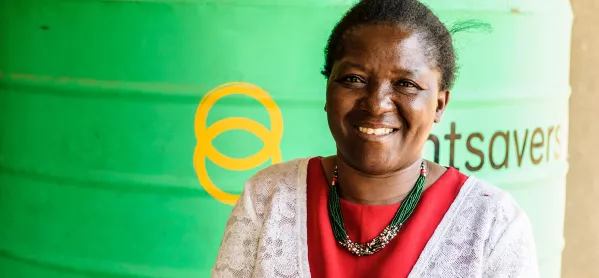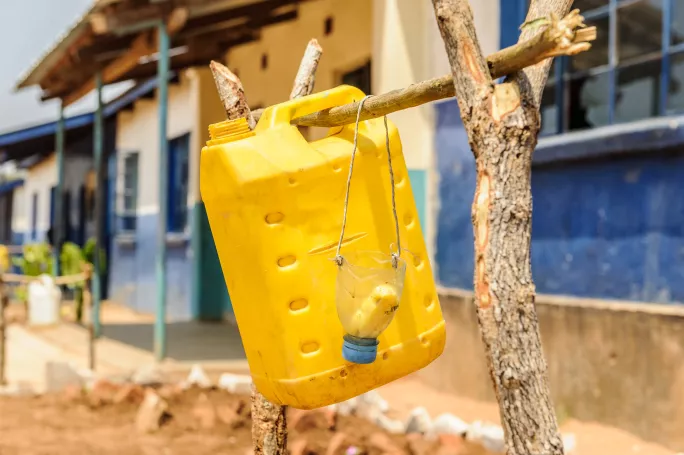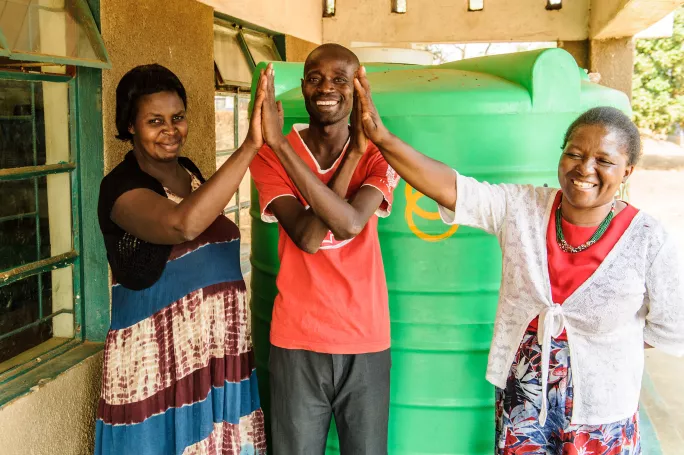- Home
- For Maureen Mwinga, ‘education comes second to keeping pupils healthy’
For Maureen Mwinga, ‘education comes second to keeping pupils healthy’

Every morning I see children walking to my school, Ngangula School, Chinkankata, Zambia, from miles away, each swinging a water container.
The nearest well of water is 2.5km away. It’s too far for children to go during the day and would interrupt their lessons. We tell every child to bring their own container from home to fill up the tippy-taps outside each class. These are hands-free wash stands made from jerry cans and sticks, tied together with string. They operate by foot lever to stop any bacteria spreading - the children only touch the soap.
Class monitors are responsible for filling up the tippy-taps and checking them several times a day. Children need somewhere to wash their hands and faces, to stop them getting infectious disease. They also check that the medicated soap has not fallen in the dust and got dirty.

At our school, a child’s health is more important than how much they learn. We are one of the most remote schools in the district and children aged between three and 18 come from communities as far as an hour away. If the young ones get ill, or their eyes get spoiled by trachoma (a common eye disease here caused by bad bacteria - it can leave children blind), their attendance goes down. But when children are at their full health, they don’t miss classes and perform much better. We work hard at combining health and academic, that way our pupils cannot fail to do their best.
I really want to make this a school of excellence. At the moment, we struggle, as we have little infrastructure. We don’t have enough classrooms, or power for children to stay and do their homework after school.
But by working with our community we can make things better. This year for the first time we have Grade 12 doing their exams at this school. The community also paid the wages for five more teachers who are not on the government payroll. Before this, we had just 20 teachers for 1,000 children.

One of my proudest moments was when we won a water tank at an inter-school competition for a programme called Super School of 5. This was an initiative from charity Sightsavers and Unilever’s Lifebuoy soap to stop children getting trachoma. It uses superheroes to teach children how to wash their hands and faces to stop infection spreading.
The contest was judged by a panel of supervisors from the Ministries of Health and Education. They looked at how much changed at the school: what facilities were put in, how clean it was kept, and how well the children filled in their enrolment cards and diaries. It also looked at what songs, stories and creative signs the schools did. This is a remote area with no shops so we couldn’t buy the metal signs and paints like other schools, but that didn’t stop us. I gathered the parents and the community together and they got involved.
Instead of buying resources we used natural ones. The flat stones you see outside our classrooms were from the rivers, carried up by the parents and cleaned up. Instead of signs, children drew on them pictures of the superheroes, and wrote mottos and poems about how to wash their hands and faces. The writing you see on them is not paint, but pure soils, different types, mixed up with water to make different colours. The soap holders are made from empty plastic bottles I saw being thrown away. We cut them in half and put holes in the bottom, so water from soap could drip away and stay clean and dry.
I wish that every country understood that every child has the right to education. At this school we may have fewer resources but our motto is: “A child is our concern” and each one of them is guided by their teachers to take the pathway that matches their ability and interests. This way they take the right course or job after completing school. It moulds how they live their lives.
Maureen Mwinga is the headmistress at Ngangula School, Chinkankata, Zambia
Trachoma is the world’s leading cause of infectious blindness. It can cause eyelashes to turn inwards so with every blink they scrape against the ball of the eye, slowly and painfully turning people blind. It blights the world’s poorest communities and can impact children’s learning at school, stop parents from going to work and trap whole communities in a cycle of poverty. Yet it is preventable and treatable.
As part of Super School of 5, children follow a 21-day programme featuring the adventures of five superheroes, and is funded by UK aid. The characters encourage them to understand the importance of good hygiene habits, particularly washing their face and hands with soap at five key moments in the day.
Do you want to tell the world’s teachers about your working day, the unique circumstances in which you teach or the brilliance of your class? If so, email kate.parker@tesglobal.com. We will give your school £100 if your story is published.
Keep reading for just £1 per month
You've reached your limit of free articles this month. Subscribe for £1 per month for three months and get:
- Unlimited access to all Tes magazine content
- Exclusive subscriber-only stories
- Award-winning email newsletters